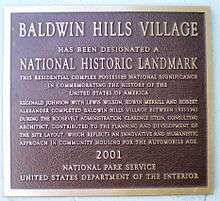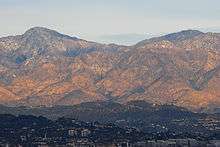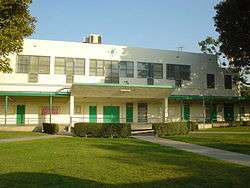Baldwin Hills, Los Angeles
| Baldwin Hills | |
|---|---|
| Neighborhood of Los Angeles | |
|
The Baldwin Hills Village Office Building, a National Historic Landmark at Village Green | |
 Baldwin Hills Location within Western Los Angeles | |
| Coordinates: 34°00′28″N 118°20′49″W / 34.007778°N 118.346944°W | |
| Country | United States |
| State | California |
| County | Los Angeles |
| City | Los Angeles |
| Time zone | PST (UTC−8) |
| • Summer (DST) | PDT (UTC-7) |
| ZIP Code | 90008 |
| Area code(s) | 323 |
Baldwin Hills is a residential community and affluent neighborhood[1] in the South region of Los Angeles, California. It is located in the namesake Baldwin Hills range overlooking the Los Angeles Basin and the lower plain immediately to the north.
Geography
Baldwin Hills is bounded by La Cienega Boulevard to the west, Crenshaw Boulevard to the east, Stocker Avenue to the south and Rodeo Road to the north with Martin Luther King Jr. Boulevard forming the northeast dividing line between Baldwin Hills and Crenshaw Manor. It is bordered on the west by Culver City and it shares the eastern border of Crenshaw Boulevard with Leimert Park.[2]
The Baldwin Hills ZIP code is 90008 and telephone area code is 323. Baldwin Hills starts at Martin Luther King Blvd. going up to the base of the hills of Baldwin Hills Estates (an area nicknamed "The Dons" for the twenty nine streets beginning with the Spanish honorific). Baldwin Hills from Martin Luther King Blvd on the North, Marlton Avenue on the East, La Brea Avenue of the West and Baldwin Hills Estates on the South.
The landform Baldwin Hills have long been drilled for petroleum with active oil wells in the mid-hills along La Cienega Boulevard. As the oil fields close, some of the otherwise undeveloped land is being acquired by agencies for the public's benefit. The Kenneth Hahn State Recreation Area is a major jewel enhancing the community with park activities and recreation. The headwaters of Ballona Creek are in the hills and park which then flows west into the Santa Monica Bay.
History
20th century
- "Lucky" Baldwin:
Baldwin Hills and other surrounding geography are named for the famous 19th century horse racing and land development pioneer, Elias J. "Lucky" Baldwin. - Rancho La Cienega o Paso de la Tijera: historic early 19th century eastern hills Rancho land grant.[3][4]
- Rancho Rincon de los Bueyes: original early 19th century western section Rancho land grant.
- Olympic Village:
View Park, close to Baldwin Hills, was the site of the very first Olympic Village ever built, for the 1932 Los Angeles Summer Olympic Games. Built for male athletes only, the village consisted of several hundred buildings, including post and telegraph offices, an amphitheater, a hospital, a fire department, and a bank. Female athletes were housed at the Chapman Park Hotel on Wilshire Boulevard. The Olympic Village was demolished after the Summer Olympic Games.[5]
Communities

Communities and sub-divisions in Baldwin Hills include:
- Baldwin Hills Estates (east of La Brea, southwest of Santo Tomas Drive, south of the Jim Gilliam Recreation Center and north of Stocker Street), one of the wealthiest and richest majority-African American areas in the United States, and is sometimes called "the Black Beverly Hills".[6] It includes the so-called Dons, winding streets with "modernistic" homes and modern low-rise Condos with panoramic views of the Downtown Los Angeles skyline. It has creative street names as "Don Luis", "Don Felipe","Don Lorenzo, Don Miguel, etc. The neighborhood is characterized by hillside houses with swimming pools, and modern condominiums (the latter often jut out from steep hillsides, perched on stilts).
- Baldwin Vista is north of Coliseum Street and west of the major thoroughfare, La Brea Boulevard, with slightly smaller homes and a more secluded ambience.[7]

- Village Green, originally named Baldwin Hills Village and within Baldwin Vista, is a historic Mid-Century modern "garden city" developed by Walter H. Leimert (1877–1970) multi-family residential, which was designated as a National Historic Landmark in 2001. The units are now condominiums on very spacious grounds, attracting seniors, young families, and design professionals as residents.
- "Baldwin Village": since 1990 the city has promoted use of the official name "Baldwin Village".[8] Located in Baldwin Hills' northeastern, flat section, between King Drive and La Brea, it consists largely of two-story apartment complex buildings of ten or more units, often originally surrounding a swimming pool and gardens, built in the late 1950's. Originally occupied mostly by adults, young families not yet able to afford home purchase began to move in around the same time that de-segregation evoked white flight in the early 1960s. In the 1970s, black gangs took up illicit drug trade in the vicinity until the late 2000's as young families are starting to return back into the community. There are also redevelopment in the area.
- The southernmost portion of Baldwin Hills is actually outside the Los Angeles City limits; it resides in the unincorporated Los Angeles County area that also shares its space with View Park-Windsor Hills and Ladera Heights. Stocker Street divides Baldwin Hills from the View Park neighborhood. The northeast face of the hills overlooks the Baldwin Hills Crenshaw Plaza shopping mall and Marlton Square's medical building.
Parks and recreation

- Baldwin Hills Scenic Overlook:[9][10] The 8.5-acre (3.4 ha) park is open daily from 8 a.m. to sunset. The Visitor Center is open Thursday–Sunday from 10 a.m. to 5 p.m. The park includes an amphitheater, drinking water, the Evan Frankel Discovery Center, gardening boxes, picnic tables, a permeable parking lot ($6), toilets, and walking paths with a central feature known as the Culver City Stairs. The Visitor Center has a comprehensive guide to the native plants of the area and history of Culver City. On a clear day the Overlook's platform offers exceptional views spanning the Pacific Ocean to the west, the Hollywood Sign to the north, and downtown Los Angeles to the east.[11]
- Kenneth Hahn State Regional Park: recreation and sports areas, and preservation of the open-space lands and native habitats: entrance on South La Cienega Boulevard.[12]
- Norman O Houston Park[13]
- Jim Gilliam Recreation Center[14]
Government
Services
- The majority of Baldwin Hills receives services from the city of Los Angeles. Most of Baldwin Hills is served by the Los Angeles Fire Department and the Los Angeles Police Department (LAPD).
- A small southern portion of Baldwin Hills lies in unincorporated Los Angeles County and receives police services from the Los Angeles County Sheriff's Department and fire protection from the Los Angeles County Fire Department.
Library
The Los Angeles Public Library operates the Baldwin Hills Branch Library.[15]
Education

Baldwin Hills is served by Los Angeles Unified School District. Baldwin Hills also has a charter school.[7] The schools operating within Baldwin Hills borders are:
- Baldwin Hills Elementary School[16]
- Audubon Middle School
- Susan Miller Dorsey High School
- Windsor Math/Science/Aerospace Magnet (K–5, zoned only for Kindergarten)
- Hillcrest Drive Elementary School.
- Marlton School
- New Designs Charter School
Demographics
The Baldwin Hills population was 78.5% African American in the 2000 U.S Census population.
Zip Code
Baldwin Hills's ZIP code is 90008.[17]
Baldwin Hills is among the wealthiest majority-black communities in the United States. Prior to 1965 and restrictive covenants being eliminated, it was known as "Pill Hill" because a large number of doctors and psychologist seemed to live in the neighborhood.
Celebrity residents
Baldwin Hills has been home to many celebrities such as: Michael J. Fox, Ray Charles, Jimmy Pardo, Cal Worthington, Tina Turner, "Bubba" Smith, renowned famous architect Paul Williams, Nancy Wilson, Oscar-nominated film director John Singleton, and the late Los Angeles Mayor Tom Bradley.
Disasters
On December 14, 1963, a crack appeared in the Baldwin Hills Dam impounding the Baldwin Hills Reservoir. Within a few hours, water rushing through the crack eroded the earthen dam, gradually widening the crack until the dam failed catastrophically at 3:38 pm. Although the area had been evacuated after the crack had been discovered, several homes were destroyed, and most of Baldwin Vista and the historic Village Green community were flooded. The dam's failure was ultimately determined to be the result of subsidence, caused by overexploitation of the Inglewood Oil Field. The dam's failure prompted the Los Angeles Department of Water and Power to close and drain other small local reservoirs with similar designs, such as the Silver Lake Reservoir. The Baldwin Hills Dam was not rebuilt—instead, the empty reservoir was demolished, filled with earth, landscaped, and converted to Kenneth Hahn Regional Park.
During the summer of 1985, an arsonist started a brush fire along La Brea Avenue. The fire spread up the canyon towards the expensive homes along Don Carlos Drive in the Baldwin Hills Estates tract. Many homes were destroyed despite the efforts of the Los Angeles Fire Department to suppress the flames. The fire killed three people and destroyed 69 homes;[7] the arsonist was never caught.
Media
From 2007 to 2009, Black Entertainment Television (BET) aired Baldwin Hills, a program featuring several African-American teenagers and their lives in the upper-middle class Los Angeles community.[18][19]
The show is very similar in nature to such MTV programs as Laguna Beach: The Real Orange County, The Hills, and the online series The Suburbs, as it features African-Americans of upper-middle-class families who divide their time between attending school, playing sports, shopping at high-end stores, and driving expensive cars. The series lasted for three seasons.
Orson Scott Card's urban fantasy novel Magic Street is set in Baldwin Hills.
Notable residents
- Tom Bradley
- Ray Charles
- David S. Cunningham, Jr.
- Danny Elfman[20]
- Michael J. Fox
- Jimmy Pardo
- Susan Rasky
- John Singleton
- Bubba Smith
- Tina Turner
- Paul Williams
- Nancy Wilson
- Cal Worthington
See also
References
- ↑ The Mapping L.A. project of the Los Angeles Times combines Baldwin Hills with the Crenshaw District to form an area it calls Baldwin Hills/Crenshaw. The Thomas Guide for Los Angeles County (2004) lists each neighborhood separately (page n).
- ↑ Kemp Powers, "The Neighborhood Project," LAist, August 17, 2007
- 1 2 "Rancho La Cienega O'Paso de La Tijera". =Laokay.com. Retrieved August 22, 2010.
- ↑ U.S. Geological Survey Geographic Names Information System: Rancho La Cienega o Paso de la Tijera
- ↑ "1932 Los Angeles Olympic Athlete's Village in the Baldwin Hills". Baldwinhillspark.info. Retrieved November 12, 2007.
- ↑ Hale, Mike (2007-08-07). "Posh Princes and Princesses of the Hills". New York Times. Retrieved 2008-08-13.
- 1 2 3 Pollard-Terry, Gayle (October 29, 2006). "Years later, the pitch still delivers". Neighborly Advice. Los Angeles Times. p. K2.
- ↑ Erika Hayasaki, "Gang Violence Fuels Racial Tensions," Los Angeles Times, September 30, 2006, page B-1. Link requires the use of a library card.
- ↑ Baldwin Hills Scenic Overlook. accessed 8/22/2010
- ↑ "trail map" (PDF). Retrieved 2012-09-13.
- ↑ "Baldwin Hills Recreation Center". City of Los Angeles. Retrieved on March 23, 2010.
- ↑ "Kenneth Hahn State Park". Parks.ca.gov. Retrieved August 22, 2010.
- ↑ "Norman O Houston Park website". Laparks.org. Retrieved 2012-09-13.
- ↑ "Jim Gilliam Recreation Center website". Laparks.org. Retrieved 2012-09-13.
- ↑ "Baldwin Hills Branch Library". Los Angeles Public Library. Retrieved on March 23, 2010.
- ↑ "Baldwin Hills Elementary School". Lausd.k12.ca.us. Retrieved 2012-09-13.
- ↑ "U.S. Census Bureau data on zip code 90008". Factfinder.census.gov. Retrieved 2012-09-13.
- ↑ "Baldwin Hills". BET. Archived from the original on August 4, 2007. Retrieved January 9, 2015.
- ↑ Can "Baldwin Hills" become the black "Laguna Beach"?
- ↑ "Elfman in L.A.". Elfman.filmmusic.com.
External links
| Wikimedia Commons has media related to Baldwin Hills, Los Angeles. |
- Friends of the Baldwin Hills website
- The Baldwin Hills Conservancy website
- official Kenneth Hahn State Recreation Area website
- lacounty.info: Kenneth Hahn Recreation Area
- Baldwin Hills Scenic Overlook Park website
- Village Green website
- Village Green: historic architecture article
- 1932 Los Angeles Olympic Athlete's Village in the Baldwin Hills: history
- Baldwin Hills Dam history
- University Park Family—a collaborative online community: focused on University Park, Expo Park and the surrounding areas.
- Leimert Park Beat—a collaborative online community focused on Leimert Park: "The Soul of Los Angeles and the African American cultural center of the city."
Coordinates: 34°00′28″N 118°20′49″W / 34.00778°N 118.34694°W

